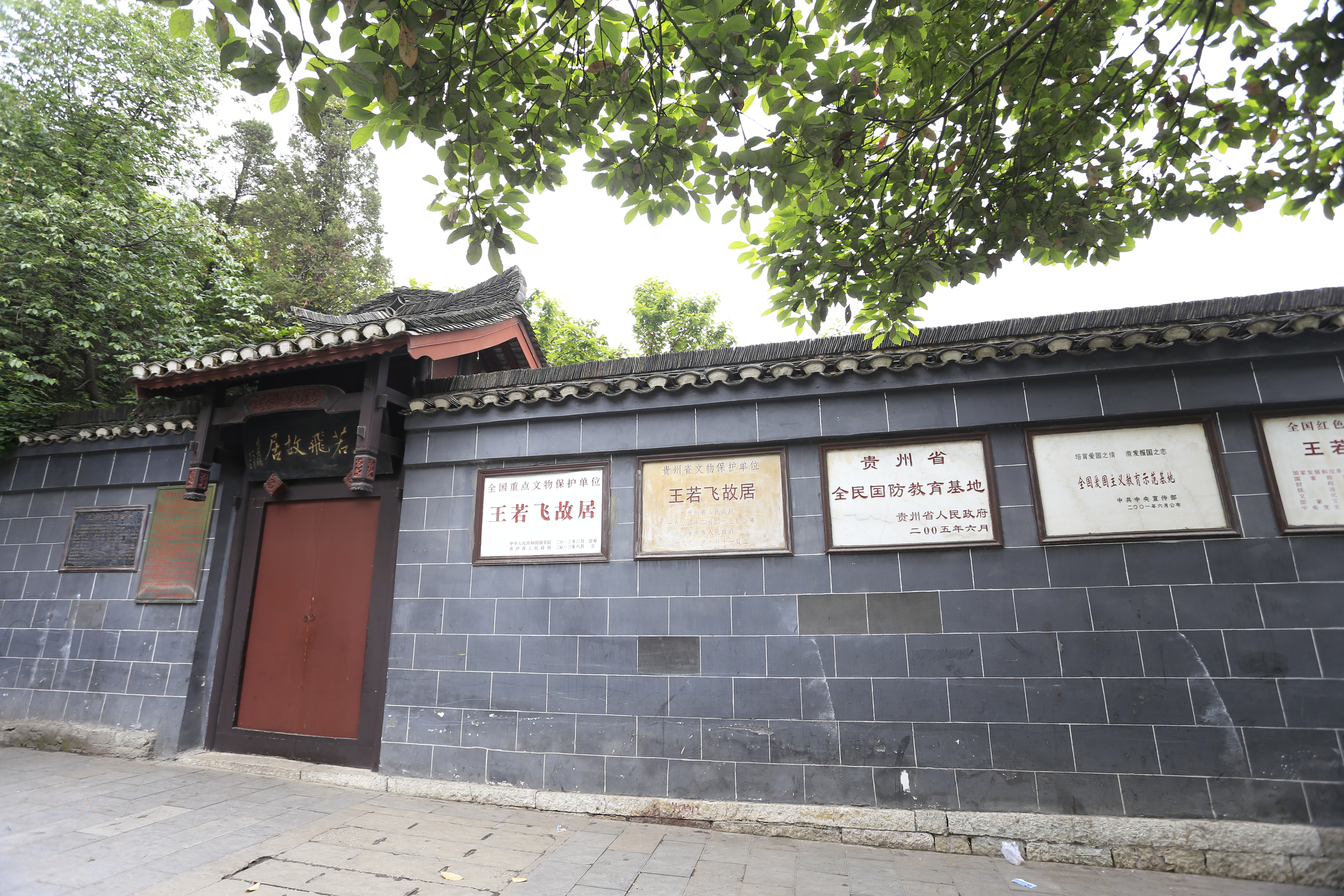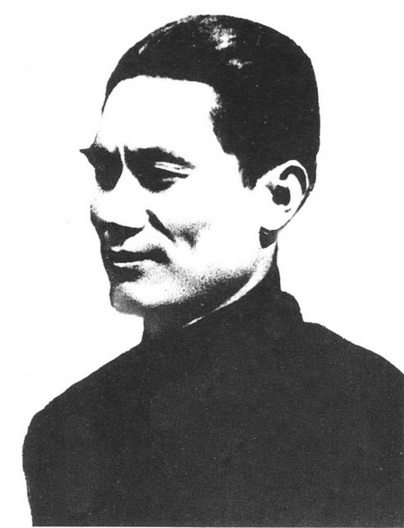|
Wang Ruofei
Wang Ruofei (11 October 1896 – 8 April 1946) was a high-ranking member of the Chinese Communist Party. He studied in France in the 1920s, where he joined the Communist Party, was trained in the Soviet Union, served five years in prison on his return to China, and was killed along with several other high officials in a plane crash in 1946. Early life and education Wang was born into a landlord family in the poverty stricken province of Guizhou, where he was raised by his uncle, Huang Qisheng. He studied for a little over a year at Waseda University in Japan, though he spent more time in independent study than in class. He and his uncle then went to France in 1919 as students on the Diligent-Work Frugal Study program, by chance on the same ship as Cai Hesen, Cai Chang, and Xiang Jingyu. His early experience in France was highly favorable. On a spring day in 1920 he wrote in his diary: :"In the morning I went to the park to read.... The small children follow the grown-ups, danc ... [...More Info...] [...Related Items...] OR: [Wikipedia] [Google] [Baidu] |
Wang (surname)
Wang () is the pinyin romanization of the common Chinese surnames (''Wáng'') and (''Wāng''). It is currently the most common surname in mainland China, as well as the most common surname in the world, with more than 107 million worldwide. ublic Security Bureau Statistics: 'Wang' Found China's #1 'Big Family', Includes 92.88m People" 24 Apr 2007. Accessed 27 Mar 2012. Wáng () was listed as 8th on the famous list of the '' [...More Info...] [...Related Items...] OR: [Wikipedia] [Google] [Baidu] |
Shanxi
Shanxi (; ; formerly romanised as Shansi) is a landlocked province of the People's Republic of China and is part of the North China region. The capital and largest city of the province is Taiyuan, while its next most populated prefecture-level cities are Changzhi and Datong. Its one-character abbreviation is "" (), after the state of Jin that existed there during the Spring and Autumn period. The name ''Shanxi'' means "West of the Mountains", a reference to the province's location west of the Taihang Mountains. Shanxi borders Hebei to the east, Henan to the south, Shaanxi to the west and Inner Mongolia to the north. Shanxi's terrain is characterised by a plateau bounded partly by mountain ranges. Shanxi's culture is largely dominated by the ethnic Han majority, who make up over 99% of its population. Jin Chinese is considered by some linguists to be a distinct language from Mandarin and its geographical range covers most of Shanxi. Both Jin and Mandarin are spoken in ... [...More Info...] [...Related Items...] OR: [Wikipedia] [Google] [Baidu] |
1896 Births
Events January–March * January 2 – The Jameson Raid comes to an end, as Jameson surrenders to the Boers. * January 4 – Utah is admitted as the 45th U.S. state. * January 5 – An Austrian newspaper reports that Wilhelm Röntgen has discovered a type of radiation (later known as X-rays). * January 6 – Cecil Rhodes is forced to resign as Prime Minister of the Cape of Good Hope, for his involvement in the Jameson Raid. * January 7 – American culinary expert Fannie Farmer publishes her first cookbook. * January 12 – H. L. Smith takes the first X-ray photograph. * January 17 – Fourth Anglo-Ashanti War: British redcoats enter the Ashanti capital, Kumasi, and Asantehene Agyeman Prempeh I is deposed. * January 18 – The X-ray machine is exhibited for the first time. * January 28 – Walter Arnold, of East Peckham, Kent, England, is fined 1 shilling for speeding at (exceeding the contemporary speed limit ... [...More Info...] [...Related Items...] OR: [Wikipedia] [Google] [Baidu] |
Chinese Communist Party Politicians From Guizhou
Chinese can refer to: * Something related to China * Chinese people, people of Chinese nationality, citizenship, and/or ethnicity **''Zhonghua minzu'', the supra-ethnic concept of the Chinese nation ** List of ethnic groups in China, people of various ethnicities in contemporary China ** Han Chinese, the largest ethnic group in the world and the majority ethnic group in Mainland China, Hong Kong, Macau, Taiwan, and Singapore ** Ethnic minorities in China, people of non-Han Chinese ethnicities in modern China ** Ethnic groups in Chinese history, people of various ethnicities in historical China ** Nationals of the People's Republic of China ** Nationals of the Republic of China ** Overseas Chinese, Chinese people residing outside the territories of Mainland China, Hong Kong, Macau, and Taiwan * Sinitic languages, the major branch of the Sino-Tibetan language family ** Chinese language, a group of related languages spoken predominantly in China, sharing a written script (Chinese ... [...More Info...] [...Related Items...] OR: [Wikipedia] [Google] [Baidu] |
Chinese Revolutionaries
Chinese can refer to: * Something related to China * Chinese people, people of Chinese nationality, citizenship, and/or ethnicity **'' Zhonghua minzu'', the supra-ethnic concept of the Chinese nation ** List of ethnic groups in China, people of various ethnicities in contemporary China ** Han Chinese, the largest ethnic group in the world and the majority ethnic group in Mainland China, Hong Kong, Macau, Taiwan, and Singapore ** Ethnic minorities in China, people of non-Han Chinese ethnicities in modern China ** Ethnic groups in Chinese history, people of various ethnicities in historical China ** Nationals of the People's Republic of China ** Nationals of the Republic of China ** Overseas Chinese, Chinese people residing outside the territories of Mainland China, Hong Kong, Macau, and Taiwan * Sinitic languages, the major branch of the Sino-Tibetan language family ** Chinese language, a group of related languages spoken predominantly in China, sharing a written script (Chi ... [...More Info...] [...Related Items...] OR: [Wikipedia] [Google] [Baidu] |
Chinese Communists
The Chinese Communist Party (CCP), officially the Communist Party of China (CPC), is the founding and One-party state, sole ruling party of the China, People's Republic of China (PRC). Under the leadership of Mao Zedong, the CCP emerged victorious in the Chinese Civil War against the Kuomintang, and, in 1949, Mao Proclamation of the People's Republic of China, proclaimed the establishment of the People's Republic of China. Since then, the CCP has governed China with List of political parties in China, eight smaller parties within its United Front (China), United Front and has sole control over the People's Liberation Army (PLA). Each successive leader of the CCP has added their own theories to the Constitution of the Chinese Communist Party, party's constitution, which outlines the ideological beliefs of the party, collectively referred to as socialism with Chinese characteristics. As of 2022, the CCP has more than 96 million members, making it the List of largest political parties ... [...More Info...] [...Related Items...] OR: [Wikipedia] [Google] [Baidu] |
Xinhua Bookstore
Xinhua Bookstore () is the largest and only country-wide bookstore chain brand in China. History Xinhua Bookstore (in ) was originally established as Guanghua Bookstore (in ) in 1937 in Yan'an under the Propaganda Department of the Communist Party of China. In 1942, Guanghua Bookstore changed its name to Xinhua Bookstore. The four Chinese letter "Xin-hua Shu-dian" logo was made in brush writing in 1948 by Chairman Mao Zedong. In 1951, during the First All-China Publishing Administration Conference, it was decided to divide the vertically integrated operation into the People's Publishing House, Xinhua Publishing Plant, and the Xinhua Bookstore. On the upper floor of the store, there was a “no foreigners” floor, which sold a large number of various dictionaries and dictionaries that could be copied without permission from Japan, Europe, and North America, despite the state-owned bookstore. In 2003, all Xinhua Bookstores in Beijing was reorganized, coming under the (in ... [...More Info...] [...Related Items...] OR: [Wikipedia] [Google] [Baidu] |
China Youth Publishing House
China Youth Publishing House (traditional Chinese: 中國青年出版社; simplified Chinese: 中国青年出版社), commonly known as China Youth Press, abbreviated as CYP, is a Beijing-based publishing house in the People's Republic of China, directly under the leadership of the Central Committee of the Communist Youth League of China (CCCYLC, 共青团中央). It is a comprehensive youth reading press for the whole of China. History In the autumn of 1949, the Chinese New Democracy Youth League (中国新民主主义青年团) set up a publishing committee, and in January 1950, the Youth Press (青年出版社) was formally established. In 1953, the General Administration of Press and Publication and Propaganda Department of the Chinese Communist Party The Publicity Department of the Central Committee of the Communist Party of China, also known as the Propaganda Department or Central Propaganda Department, is an internal division of the Chinese Communist Party (CCP) ... [...More Info...] [...Related Items...] OR: [Wikipedia] [Google] [Baidu] |
1946 United States Air Force DC-3 Crash At Yan'an
The 1946 United States Air Force C-47 crash, known in China as the April 8 Incident, was the crash of US Army Air Force C-47B-1-DL (registration 43–16360) from Chongqing to Yan'an that struck a mountain in Shaanxi, China, killing all four crew members and 13 passengers, including several top Communist Chinese leaders. Background Following the end of World War II, the Kuomintang government of China and the Chinese Communist Party (CCP) commenced negotiations for a political settlement to form a joint government. During WWII, the US Air Force set up operations at Chongqing, including the Flying Tigers units that fought Japanese forces in China. The US military remained in Chongqing after the end of the war, and US government agents were instrumental in organizing negotiations between the Kuomintang and CCP. In order to facilitate these negotiations, the US Air Force flew CCP representatives between the Communist headquarters at Yan'an in Shaanxi province to Chongqing. Accident T ... [...More Info...] [...Related Items...] OR: [Wikipedia] [Google] [Baidu] |
Ye Ting
Ye Ting () (September 10, 1896 – April 8, 1946), born in Huiyang, Guangdong, was a Chinese military leader who played a key role in the Northern Expedition to reunify China after the 1911 Revolution. After serving with the Kuomintang, Ye later joined the Communist Party of China (CPC). Early life Ye was born on April 10, 1896 (August 4 of Guangxu 22nd year in Qing Dynasty) at Zhoutian village, Danshui town, in Guishan county, located in the Guangdong province. Ye's ancestors migrated from Ye county in Henan to the south, through Meizhou and Hingning, eventually settling in Guangdong. Ye's grandfather was Ye Hanchu, who had experience in medicine. Ye's father was Ye Xisan, who travelled to Malaysia in his early life to work on a plantation, learning how to plant tropical fruits. After returning to his hometown, Ye's father rented 11 mus' of farmland and planted fruit trees to make a living. Ye's mother's last name is Wu and he is the eighth child in the family. Ye ... [...More Info...] [...Related Items...] OR: [Wikipedia] [Google] [Baidu] |
Deng Fa
Deng Yuanzhao or Deng Fa () (March 7, 1906 – April 8, 1946) was an early leader of the Chinese Communist Party. He was born in Yuncheng District, Yunfu, Guangdong, and participated in the Canton–Hong Kong strike and the Guangzhou Uprising in his youth. He later engaged in underground work in Guangzhou and Hong Kong for the CCP, and become Party Committee Secretary of Guangzhou and Hong Kong and head of the Organisation Department in Guangdong. After 1931, he was active in the Jiangxi–Fujian Soviet and worked as the Party Committee Secretary of Fujian, and head of the State Political Security Bureau. He later assisted in the war, becoming the Political Director of the Shaan-Gan Army's 3rd Column, in charge of the secret police. His handling of the position earned him the nickname of China's Dzerzhinsky; he was present in the Long March. During the Second Sino-Japanese War, he was appointed representative of the CCP to Xinjiang, and among other positions, became the fifth ... [...More Info...] [...Related Items...] OR: [Wikipedia] [Google] [Baidu] |


.jpg)


